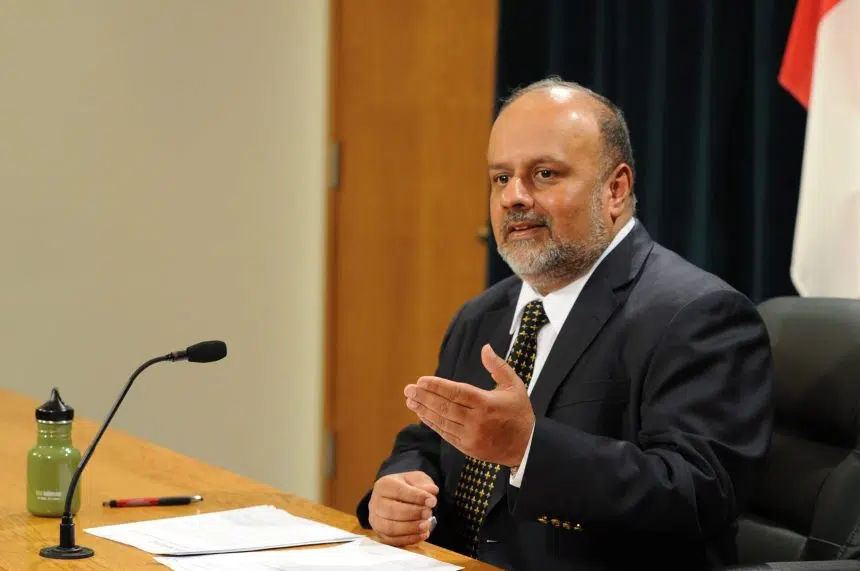Saskatchewan confirmed Thursday the first presumptive case of the COVID-19 coronavirus in Saskatoon.
The person was tested on Monday in Saskatchewan and has been well enough to self-isolate in their home. According to a media release, the person is in their 60s and had recently travelled to Egypt.
Dr. Saqib Shahab, the Ministry of Health’s chief medical health officer, said he’s confident this case has been contained.
“The individual has had very little contact with anyone else apart from one person in the house,” Shahab said during a media conference.
Shahab said the general public doesn’t need to be concerned, that Public Health will contact anyone who needs to be aware.
“We’ve been saying for some time now that, with several cases being reported in Canada due to travel, we were expecting to see a case at some point. We will expect to see more cases in the future, primarily linked to travel, but we remain vigilant to also detect cases which may not have travelled,” he said.
The provincial lab reported the positive sample Thursday, and it has been forwarded to the national lab in Winnipeg for confirmation.
The province will continue sending positive samples to the national lab for a short while as a check, then will eventually do all testing in house.
The current guidelines say that anyone arriving back from travel to any high-risk places should isolate themselves for two weeks, and anyone who arrived back from a trip abroad anywhere should monitor themselves for two weeks for symptoms — including fever, cough or difficulty breathing — for 14 days after getting back.
Shahab said people who are self-monitoring should also avoid any large gatherings for those two weeks.
Anyone with even mild symptoms is asked to stay home and call HealthLine 811 for advice.
There has been talk in Quebec about telling anyone travelling to self-isolate, but Shahab said that would include thousands of people and it’s not practical.
When it comes to a pandemic, Shahab said the province’s first aim is to contain it, which is what health officials are doing right now.
“And we want to remain in containment as long as we can,” he said. “How long we will remain depends on all of us doing the right thing.”
That means if you travel and have symptoms, you’re advised to isolate yourself, seek advice and get tested.
Then Shahab said authorities want to delay any potential spread, which means isolating any close contacts with those who are infected.
“We also want to be very mindful of large events and other gatherings where, if there’s a risk, we want to put in either special precautions about how large events happen or might even consider cancelling large events,” he said.
And then there’s mitigation, which Shahab said means just providing health care.
Shahab relayed that experts say most people will eventually be exposed to the virus.
“The aim is that everyone shouldn’t get exposed in one month because that’ll put tremendous strain on the health-care system and we want to spread the curve and flatten the curve over months to years because everything becomes more manageable.”
The Health Minister said there weren’t any estimates yet for how much dealing with the pandemic will cost, saying it’s still in early days. He also didn’t know yet how much money the province would be getting from the federal government for these expenses.
The province isn’t testing just anyone for the virus. The first priority is to test people who’ve come from travel and anyone with whom the travellers have had close contact.
Shahab said health officials are now recommending that anyone be tested who develops a severe respiratory illness and there isn’t any other explanation other than the virus. Any outbreak in a long-term care facility where there is no other explanation will trigger screening.
The ministry has a list of tips for people to protect themselves against getting sick:
- Wash your hands frequently, for at least 20 seconds at a time;
- Do not touch surfaces and then your mouth, eyes or nose;
- Use tissues when you cough or sneeze and dispose of them immediately; use your elbow if a tissue is not available;
- Practise social distancing by not shaking hands, hugging, etc.; and,
- Stay home if you become ill to prevent the spread of the illness.
We’re live from the Sask. Legislature for an update from the Chief Medical Health Officer, Saqib Shahab, for the latest on COVID-19.
Posted by 980 CJME on Thursday, March 12, 2020











